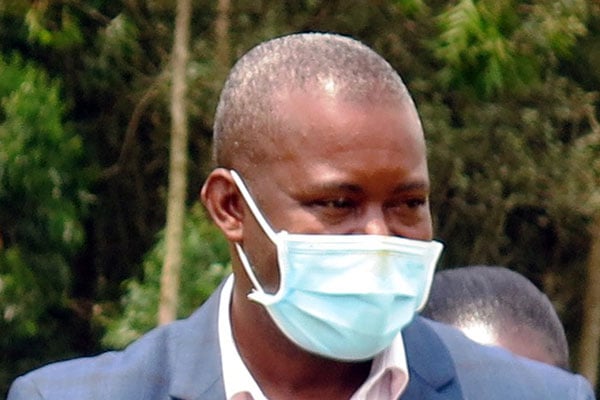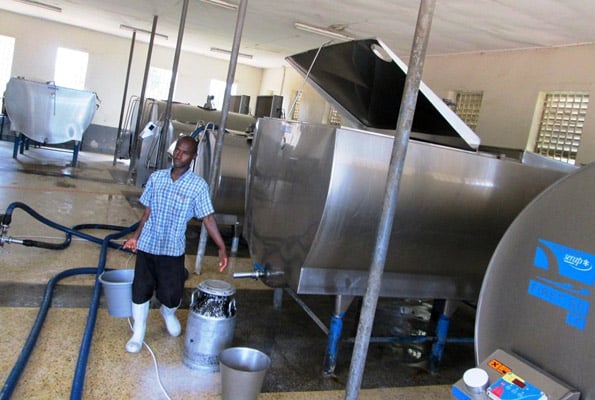Prime
How irrigation has helped Ntungamo farmers overcome drought

Sam Mucunguzi Rwakigoba, LC5 chairperson Ntugamo District. PHOTO/FILE.
What you need to know:
- The project, which has been implemented across Ntungamo’s five counties, cost approximately Shs1.6 billion, with farmers contributing more than Shs400 million.
At least 84 farmers in Ntungamo District have benefited from the World Bank-funded Micro-Scale Irrigation Programme implemented by Ministry of Agriculture, Animal Industry, and Fisheries.
The initiative, launched in the 2022/2023 financial year, aims to enhance farmers’ resilience to prolonged dry spells that typically result in significant crop losses.
Farmers are co-funding part of the project to ensure sustainability.
The region has experienced increasing crop failures, particularly during the dry spell from April to August, which often leads to the loss of over 40 percent of crops and, in severe cases, the death of livestock.
“Most of the coffee planted during the first rains between February and May usually dries up during the long dry spell. Our bananas are also affected, and we cannot grow seasonal crops without irrigation. Water is expensive without external aid,” Mr James Namara, a farmer in Nyarubaare, Ntungamo Sub-county, said.
The Micro-scale Irrigation Programme has provided irrigation systems to farmers, covering a minimum of 2.4 acres per beneficiary. However, the project initially faced challenges with uptake.
“At first, many farmers were hesitant to participate, leading to unutilised funds that were returned at the end of the 2022/2023 financial year. However, last year, all funds were utilised, and we even have pending applications for this year,” Mr Mathias Ndifuna, the Ntungamo’s chief administrative officer, said.
The project, which has been implemented across Ntungamo’s five counties, cost approximately Shs1.6 billion, with farmers contributing more than Shs400 million.
“We received Shs800 million last financial year, and after the ministry returned the previously unspent funds, we utilised the full Shs1.6 billion. This year, we have Shs1.2 billion allocated for the project, and we aim to support even more farmers,” Mr Daniel Bwino Amanya, the Ntungamo District agriculture engineer, said.
Despite the project’s progress, more than Shs800 million was returned to the central government at the end of the last financial year due to the slow pace of implementation. The cost of each irrigation project ranges between Shs12 million and Shs18 million, with farmers contributing 25 percent of the total cost, and the World Bank, through the Ministry of Agriculture, covering the rest.
Farmers dig wells and dams for water sources, from which water is pumped to the highest point of the farm. A solar-powered system then pumps water into a storage tank, from where it is distributed through gravity for drip, sprinkle, or other irrigation systems.
The District Agriculture Officer, Ms Esther Atwine, emphasised that most areas in Ntungamo are severely affected by the dry spell, with more than 60 percent of crops lost during the June to September period, which has the lowest rainfall.
“Farmers can no longer rely solely on rainfall as the rainy season’s sustainability has decreased due to climate change,” Ms Atwine said.
The Ntungamo District Chairman, Mr Sam Mucunguzi, praised the government’s efforts to expand irrigation, saying it is as a critical step toward reducing poverty in the district and the country. Six projects were commissioned last week in Kajara County, with more awaiting commissioning but already operational, according to Mr Bwino.
During the commissioning of the projects at Kagamba Catholic Parish, the Resident District Commissioner of Ntungamo, Mr Geoffrey Mucunguzi, encouraged farmers to adopt irrigation practices and learn from their neighbours who have already benefited.
Several farmers expressed satisfaction with the irrigation systems, saying the initiative will significantly boost productivity.
Rev Fr Cornrad Nkamwesiga of Kagamba Parish said more than 80 percent of his 1,031 coffee seedlings had dried up before the installation of the irrigation system.
One of the first beneficiaries, Mr Julius Nandeeba, credited the irrigation for saving his five-acre coffee plantation, which nearly dried up last year.
Similarly, Dr Bildard Baguma, who shares an irrigation system with three other farmers in Kyenshaki, Rwashamaire Town Council, highlighted the benefits beyond crop production, including improved access to water for fish farming and clean water for household use.




